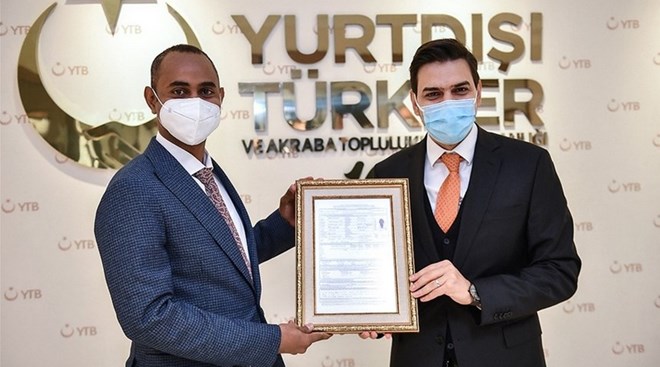 Saturday February 12, 2022
Saturday February 12, 2022
Turkey Scholarships, Turkey’s wildly popular grant program for international students, have attracted the attention of Somali youth who plan to take advantage of their country’s strengthening ties with Turkey.
Since Turkey and Somalia revived their relations with a landmark visit in 2011 by then-Prime Minister Recep Tayyip Erdoğan, thousands of Somalis have benefited from the Türkiye Scholarships program, realizing their dream of obtaining a degree.
More than 10 years later, large numbers of Somali students continue to enroll in the program every year, with Somalia becoming one of the top countries in Africa for sending students to Turkey for higher education.
A large number of them return to their country to start careers. Former students include Somalia’s Defense Minister Abdulkadir Mohamed Nur, who was educated in Turkey after becoming a diplomat and served as justice minister before assuming his current position.
But not all Somali students want to go to Turkey to get a university education. Anisa Abduqadir Ali, 19, told Anadolu Agency (AA) that for the last two years, she has attempted to travel to Turkey several times to finish her high school education. She said she dropped out of high school in Somalia’s Lower Shabelle region due to insecurity and her father’s low income. As her aunt resides in the Turkish capital Ankara, she has been dreaming of going to Turkey to finish high school and then get accepted to a university to study medicine.
Mohamed Mohamud, deputy chief of the Somali Turkey Alumni Association, told AA in an interview in the capital Mogadishu that according to the number of scholarships awarded to Somalis since 2011, Somalia is the greatest beneficiary of Turkish scholarships in Africa. Mohamed also studied in Turkey, graduating from Fırat University in Elazığ.
After returning to his country, Mohamed became the deputy rector of one of Somalia’s best universities, SIMAD University. “I can estimate that almost 5,000-plus active Somali students are in Turkey right now. More than 9,000 Somali students went to Turkey either through Turkish scholarship, full or partial, or were self-sponsored,” Mohamed said. He noted that the majority of Somali students finish their studies, but there is a number of Somali students who drop out.
He said that Turkey is partially a European country with a high standard of living. Those who returned to Somalia are playing different roles in the country. They work in the education field such as secondary schools, universities or colleges, or public institutions, especially the immigration agency and the airport. Some of them have established their own businesses franchised by international companies based in Turkey.
Speaking about the Turkish scholarship program, Mohamed said it played a crucial role in the development of Somalia. “It created hope for many Somali youths to continue their education overseas. It became part of the peace-making process in Somalia because if everyone is well educated then we will have a better and peaceful society,” he said.
Mohamed Isse Abdullahi was one of Somalia’s first students to apply for the scholarship in Turkey. He studied theology, economics, management and organizational leadership at Uludağ University. He told AA there are some challenges Somali students face in Turkey: Among them is the language barrier. He said Turkish universities teach everything in the Turkish language and that is one of the biggest challenges Somali students face in terms of education.
Abdulkarim Abdulle also studied in Turkey. He says that the high standards of the education system in Turkey along with other political and economic factors make Turkey a top choice.
“Somalia has been one of the top beneficiaries of the scholarship since (President Recep Tayyip) Erdoğan`s first visit to Mogadishu in 2011,” Abdulle said. “Students go to Turkey for both undergraduate and graduate studies because of the privileges and the priority given to Somali students,” he said.

